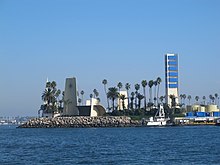THUMS Islands
Since 1967, they have also been known as the Astronaut Islands, each individual island having been named in honor of an American astronaut who lost their lives in the service of NASA. Island Freeman (Theodore C. "Ted" Freeman) is named for the first astronaut to perish in active duty (piloting a T-38 Talon jet trainer). Islands Chaffee (Roger B. Chaffee), Grissom (Virgil I. "Gus" Grissom) and White (Ed White) are named after the Apollo 1 astronauts killed in a launch pad accident.
History

After a 1964 court case that gave the state of California mineral rights to the area, the islands were built at an estimated cost of $22 million in 1965. The islands were operated by THUMS, a consortium named after the parent companies who bid for the island contract: Texaco, Humble, Union Oil, Mobil, and Shell. The rim of the islands are made of 640,000 tons of boulders from Catalina Island, and the islands were then filled with 3.2 million cubic yards of dredged material from the bay. The islands contain significant landscaping, a waterfall, and tall structures concealing the drilling rigs, including one known as The Condo and sometimes mistaken for a hotel by those on land. The structures are lit by colored lights at night. The aesthetic mitigation cost $10 million at time of construction, and was overseen by theme park architect Joseph Linesch. They were described by a Los Angeles Times writer as "part Disney, part Jetsons, part Swiss Family Robinson".
In 1975, the state of California and the city of Long Beach sued the THUMS oil companies for artificially depressing oil prices. A federal jury cleared Exxon of all charges, and the other four oil companies settled out of court for "hundreds of millions of dollars".
A peak of 148,495 barrels per day (23,608.8 m/d) were produced in 1969. 300 million barrels (48,000,000 m) of oil were pumped from THUMS by 1974, the 500 millionth barrel of crude oil was pumped in 1980. By 1992, the pumping volume was 44,444 barrels (7,066.0 m) of oil per day through the water injection method of oil recovery, producing low-grade crude oil. The 900 millionth barrel of oil was pumped in April 2002, and the one billionth in 2011. The pumped oil contained 20% water in 1965, and by 1994 it was 92% water.
The islands and operation were purchased by Occidental Petroleum in 2000. In 2014, Occidental Petroleum spun off all California assets into California Resources Corporation (CRC), which still owns and operates THUMS Islands as of 2018.
Operations in the THUMS Islands are currently run by the THUMS Long Beach Company, which is part of the California Resources Corporation.
Islands
Island Grissom is the closest to land, containing waterfalls and more sculptured screens than the other islands.
Island Freeman is the largest of the islands, at 12 acres (4.9 ha).
Appearances in popular culture
- California's Gold Episode 10002
See also
References
- ^ Kathy Strong, Kathy (2007). Southern California Off the Beaten Path, 7th (Off the Beaten Path Series) (7th ed.). Guilford, Conn: Globe Pequot. p. 78. ISBN 978-0-7627-4429-9.
- ^ "City of Long Beach Enterprise Zone (map)". Archived from the original on July 13, 2010. Retrieved January 30, 2011.
- ^ Brittingham, Hazel (March 21, 2004). "Book highlights life, death of last USAF Captain Freeman". Arlington National Cemeter. Retrieved January 30, 2011.
- ^ Sidel, Robin (November 26, 1994). "HIDDEN TREASURE: You can't see them, but Long Beach oil wells earn big profits for energy giants and the state". Los Angeles Times. Reuters.
- ^ Ruhlow, Jerry (March 29, 1974). "Oil Pumping Mark Reached in Long Beach". Los Angeles Times. p. F23.
- ^ Reynolds, Chris (July 19, 2010). "Los Angeles oil history runs deep". Los Angeles Times. Retrieved January 30, 2011.
- ^ Proceedings of OECON IV, Offshore Exploration Conference 1969. University of Michigan. 1969. OCLC 41657854. Retrieved January 31, 2010.
- ^ Schoch, Deborah (September 17, 2006). "California oil field or bona fide islands?; Operations off Long Beach wear perfect disguise". Los Angeles Times, Houston Chronicle.
- ^ Gore, Robert J. (September 21, 1980). "THUMS UP TO HALF BILLIONTH BARREL". Los Angeles Times. p. SE10.
- ^ Holguin, Rick (March 21, 1993). "Roughnecks Drilling Deep to Bring Back Boom Times Revenue: Crews are working around the clock to sink 300 new oil wells in hopes of increasing production. If the effort succeeds, the state and city will share in the profits". Los Angeles Times.
- ^ Nero, Mark Edward (April 26, 2002). "Long Beach, Calif. Oil Producer Marks Milestone". Knight-Ridder/Tribune Business News.
- ^ "Oxy 2011 Annual Report" (PDF). p. 7. Retrieved January 12, 2018.
- ^ Newton, Edmund (December 1, 1994). "COVER STORY Over a Barrel Oil-Drilling Days May Be Numbered on Artificial Islands Off Long Beach; [Home Edition]". Los Angeles Times. p. 10.
- ^ "Oxy: THUMS". Retrieved January 30, 2011.
- ^ Olabi, Nora (December 1, 2014). "Occidental Petroleum completes California spin-off". Houston Business Journal. Retrieved May 31, 2018.
- ^ Olabi, Nora (December 1, 2014). "Occidental Petroleum completes California spin-off". Houston Business Journal. Retrieved October 27, 2018.
- ^ Smith, Jack (September 18, 1972). "A Moving Experience". Los Angeles Times. p. E1.
- ^ "Oil Islands – California's Gold (10002) – Huell Howser Archives at Chapman University". January 10, 2008.
External links
- Occidental Petroleum: About Us: THUMS
- American Petroleum Institute's Energy Tomorrow tour of the islands in 2009: part 1, part 2, FLICKR picture set
- Fuels Paradise: THUMS Islands Help Big Oil Look Good
- Trip to Long Beach oil fields from Businessweek